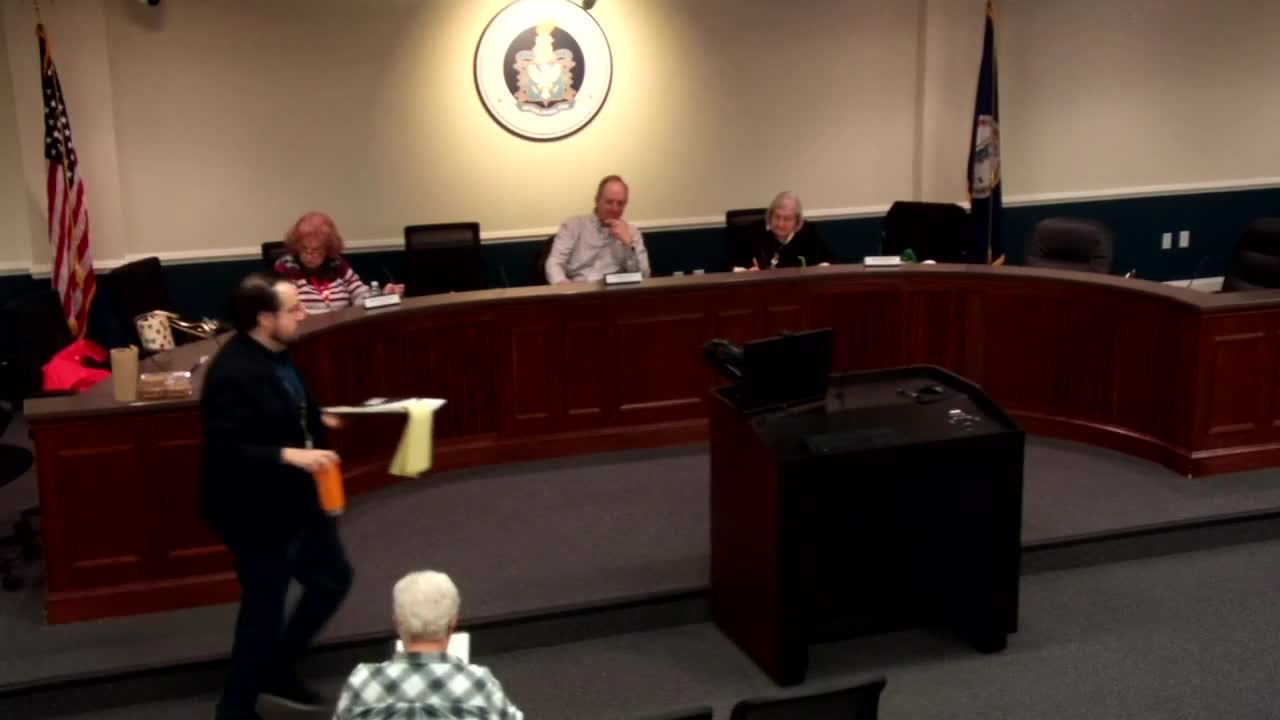Harrisonburg elections director reports high provisional and absentee volumes, proposes tech fixes and modest pay raises for technicians and chiefs
Get AI-powered insights, summaries, and transcripts
Subscribe
Summary
Mark, Harrisonburg’s Director of Elections, told the Jan. 13 Electoral Board meeting that the Nov. 5 election produced 27,645 registered voters, 17,455 votes cast (63% of registered voters), 2,489 provisional ballots received (2,342 counted) and heavy same‑day registration that strained precinct staffing and data‑entry systems.
Mark, the city’s Director of Elections, presented a comprehensive post‑election and administrative report at the Harrisonburg City Electoral Board meeting on Jan. 13, detailing turnout, provisional and absentee ballots, technology issues and a proposed modest pay increase for equipment technicians and precinct chiefs.
Turnout and ballots: Mark reported 27,645 registered voters at the close of the November election and 17,455 ballots cast — about a 63% turnout of registered voters in the city. He estimated the total citizen population over 18 in the city at roughly 40,400, meaning registered voters made up about 68% of that eligible population. Provisional ballots received totaled 2,489, of which 2,342 were counted after review. The director provided a method breakdown: 40.42% of votes cast were during early voting, 39.34% on election day, 13.51% were provisionally cast, 6.5% by mail and a 0.23% post‑election balance.
Absentee and mail ballots: For mail absentee ballots the office mailed out 1,245 ballots plus 135 (one‑time or other) requests for a combined 1,380 absentee ballots issued. Of those mailed, 46 were received but rejected (uncured through the cure process), 45 were returned undeliverable, 1,127 were counted, and 91 of the mailed ballots were never received by the deadline (with roughly 15 received after the deadline). Mark estimated the per‑mailed‑ballot physical cost (envelope, ballot, etc.) at $2.40, postage at $2.31 and staffing at about $7 per ballot, for a total of approximately $11.71 per mailed ballot and an estimated total mailed‑ballot cost of $14,579 for that election cycle.
Same‑day registration (SDR) and data entry problems: The director said SDR remained the largest operational obstacle. Harrisonburg processed 2,342 SDR-related voter credits in the post‑election effort and staff members collectively processed thousands of documents. Mark and staff told the board they consulted with their vendor (referred to in materials as KnowInk/NoInk/No Inc in meeting discussion) and with the state elections office (ELECT) about two areas: improving the precinct experience for SDRs and improving data‑entry workflows in the statewide registration system (referred to in the meeting as Verus). Because Virginia law prevents Internet connectivity in precincts, some off‑the‑shelf vendor solutions used in other states are not currently legally available; the director said he is asking vendor development teams to explore Virginia‑compliant alternatives.
As an operational experiment, the office plans to pilot using up to eight surplus laptops to permit digital entry of provisional ballot log information at the precincts and to speed later processing in the office. Mark said the digital log would not substitute for required retention of a log but could streamline redactions and FOIA requests and reduce clerical errors during data entry.
Equipment and software: Staff reported that the PollPad/KnowInk system generally operated within expectations and that vendor technical support helped resolve an LNA (logic and accuracy) glitch. The office continues to work with the vendor on a printing default that assumes a ticket printer that Harrisonburg does not use; vendors expect a fix by the June primary.
Document retention and records: The office will securely destroy roughly 150 boxes of expired documents in accordance with the Library of Virginia retention schedule referenced in the report. Staff described scanning practices for paper voter registrations into the electronic system as the primary copy, and using contracted mailing services to handle a large batch of voter notification letters after the election.
Budget and staffing: Mark said the FY26 budget is due Jan. 22 and that his submission includes line items for supplies, machine programming, travel and training, and officer pay. He provided a breakdown showing estimated election‑season supply and staffing costs: for a June primary he estimated total supplies and officers at about $51,270; for the November general the estimate was about $70,650; the combined officers and supplies figure provided to the board was about $122,300 (staff clarified these are estimates for budgeting and may not include every fringe cost).
Pay increases and board action: The director recommended modest increases for precinct chiefs and the head equipment technician and for the equipment technician team to reflect rising workload and complexity. The board voted to approve the proposed increases for the chiefs, the head equipment technician, and the equipment technician team; the motion passed with voices recorded as "Aye" (vote tally not recorded by named members in the transcript). The increases will be included in the FY26 budget submission.
Meeting schedule and next steps: The board set its next meeting for Feb. 3, 2025 (statutory officer approval in February was discussed as necessary). Mark flagged several follow‑ups: continued talks with the state elections office about Verus data workflows, vendor work on printing defaults and other LNA issues, pilot testing digital precinct logs for provisional ballots, and consideration of a permanent runner/vehicle for future high‑demand election days.
Marque quotes from the meeting included: "If we include [provisional in early voting totals], probably still election day would win out by a couple percentage points, but they're both pretty equally managed," and on SDRs: "SDR is just gonna be an extremely difficult thing to forecast and prepare for." Those are direct points Mark made in his report.
The board moved into a closed session later in the meeting to discuss personnel matters and certain election‑security topics under the cited Code of Virginia provisions; no additional public actions were taken in open session at the Jan. 13 meeting.
